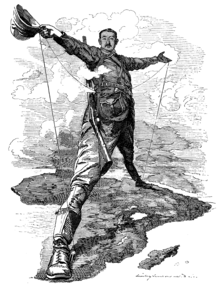Scramble for Africa
The Scramble for Africa, also called the Race for Africa was a time in history when colonial expansion in Africa became rapid. It lasted from the 1880s until the beginning of World War I. Many European countries started colonies in Africa during this time. This was a new Imperialism. The last half of the 19th century saw a change in the way countries controlled their colonies. In the old imperialism, Europeans only had direct control over small coastal areas. Now they changed from economic control by settlement, to political and military control of the colony's resources. This was seen in the fight for areas that were controlled by European nations.


Many people became famous for helping European countries find more land in Africa. They included the explorers David Livingstone, Henry Morton Stanley, and Pierre Savorgnan de Brazza as well as the French politician Jules Ferry.
The Berlin Conference (1884 - 1885) tried to end disputes between Great Britain, the French Third Republic, the German Empire, and other European countries. They agreed that "effective occupation" would be the rule for colonial claims. Laws were made for using direct rule on a colony, backed up by military power.
Other reading
change- Maria Petringa, Brazza, A Life for Africa (2006) ISBN 9781-4259-11980